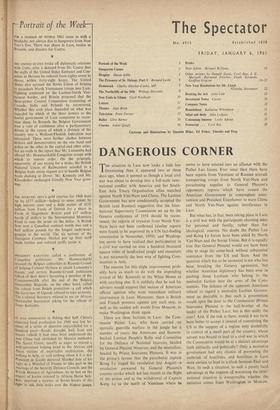—Portrait of the Week— FOR A NUMBER OF PEOPLE 1961
came in with a headache, not always due to hangovers from New Year's Eve. There was chaos in Laos, tussles in Brussels, and disastro for Castro.
THE UNITED STATES broke off diplomatic relations With Cuba, after a demand from Dr.' Castro that the staffs of the United States Embassy and Con- sulate in Havana be reduced from eighty-seven to eleven within forty-eight hours. The United States also accused the Soviet Union of helping to parachute North Vietnamese troops into Laos. Fighting continued on the Laotian-North Viet- namese border, and Britain proposed that the three-power Control Commission (consisting of Canada, India and Poland) be reconvened. Whether this took place depended on what was regarded by which of the three powers as the lawful government of Laos competent to recon- vene them. In Brussels the Belgian Government Won a vote of confidence after a parliamentary debate in the course of which a division of the country into a Walloon-Flemish federation was advocated. There were further clashes between strikers and demonstrators on the one hand and Police on the other in the capital and other cities, but no truth in the report that Mr. Lumumba had offered Mr. Hammarskjold Congolese troops with Which to restore order. On the principle, apparently, of any excuse for a strike, the British National Union of Railwaymen acceded to a Belgian trade union request not to handle Belgian boats docking at Dover. Mr. Kennedy and Mr. Khrushchev exchanged friendly New Year greet- ings.
THE STERLING AREA'S gold reserves for 1960 went 1IP by £177 million—helped to some extent by high interest rates and a little matter of £131 million from Fords of Detroit for a share in Fords of Dagenham. Britain paid 17 million worth of dollars to the International Monetary Fund to ease the strain on the dollar. A British firm won a Canadian contract worth two and a half million pounds for the longest underwater gaspipe in the world. The six nations of the European Common Market put up their tariff walls further and reduced tariffs inside it.
PRESIDENT KASAVUBU called a conference of Congolese politicians: Mr. Hammarskjiild accused the Belgian authorities in Ruanda-Urundi of helping Colonel Mobutu to attack Lumumba's troops; and certain Ruanda-Urundi politicians talked of their State's becoming a member of the Commonwealth after the end of the Belgian.. trusteeship. Buganda, on the other hand, called for release from British protection—a call which the Governor of Uganda refused to take seriously. The Colonial Secretary refused to see an African Nationalist deputation asking for the release of Joni° Kenyatta.
IT WAS ANNOUNCED in Peking that half China's expected food production for 1960 was lost be- cause of a series of disasters unparalleled for a hundred years—floods, drought, hail, frost and Insects (which it had once been understood the new China had abolished by Marxist methods). The Soviet Union, usually so eager to extend a Well-advertised helping hand to the African. and Asian victims of. imperialist exploitation, did nothing to help, or said nothing about it if it did. President dc Gaulle deprived Marshal Juin of his right as a Marshal of France to take part in the meetings of the Security Defence Council; and the British Ministry of Agriculture, by its ban on the Import of horses exposed to African Horse Sick- (1,ess, deprived a number of Soviet horses of the light to risk their necks over the Aintree jumps,










































 Previous page
Previous page